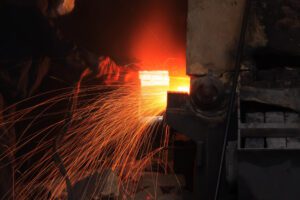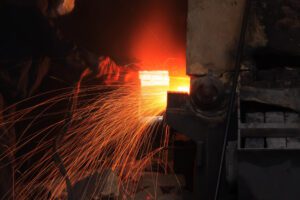
British steelmakers face mounting uncertainty as crucial talks with the United States over tariffs remain unresolved just days before a key deadline set by former US president Donald Trump.
No 10 confirmed on Monday that the UK has not yet finalised a deal to eliminate US tariffs on steel and aluminium exports, raising fears that British producers could still be subject to a punishing 50% tariff hike.
The UK had previously secured a reduced 25% tariff rate through earlier negotiations, and officials have since been working to lower that further — ideally to zero. However, Downing Street was unable to say whether it was confident a full exemption could be agreed before the 9 July deadline set by the Trump administration.
“Our work with the US continues to get this deal implemented as soon as possible,” a government spokesperson said. “That will remove the 25% tariff on UK steel and aluminium, making us the only country in the world to have tariffs removed on these products.”
While the US has agreed in principle to eliminate tariffs following a UK-US agreement signed at the G7 summit in Canada last month, the deal has yet to be formally implemented. Trump’s administration has indicated it will begin notifying trading partners who have not completed deals by 9 July, with new tariff rates due to take effect from 1 August.
Trump’s commerce secretary, Howard Lutnick, clarified that while letters would go out on 9 July, the tariffs themselves would be imposed from the beginning of August — giving British negotiators a narrow window to finalise terms and avoid disruption to exports.
Pressed on whether British ministers were confident UK steel firms would avoid being hit by the full 50% tariff, the No 10 spokesperson reiterated that “discussions continue” and emphasised the importance of ongoing engagement.
“We have very close engagement with the US, and the US has been clear that it wants to keep talking to us to get the best deal for businesses and consumers on both sides,” the spokesperson added.
The stakes are high for Britain’s steel industry, particularly following the UK government’s intervention earlier this year to prevent the closure of British Steel’s Scunthorpe plant by taking temporary public control of the company.
The ownership of British Steel by China’s Jingye Group has long been a point of contention in UK-US trade talks. Washington has raised concerns about the potential for Chinese steel to be routed through British operations in an attempt to circumvent existing US tariffs on Chinese imports.
An executive order implementing parts of the UK-US trade agreement highlighted the importance of securing supply chain integrity and transparency around the ownership and sourcing of steel and aluminium products. The order stated that the UK “has committed to working to meet American requirements on the security of the supply chains … and on the nature of ownership of relevant production facilities”.
The delay in resolving steel tariffs stands in contrast to other parts of the UK-US trade agreement. Under the deal agreed by Prime Minister Keir Starmer and President Trump at the G7, the UK aerospace sector will benefit from zero US tariffs, and tariffs on British-made cars have been reduced from 25% to 10%.
The next few days will be crucial. With less than a week to go until the US begins issuing notices to trading partners without a deal, British steel manufacturers and their employees remain in limbo, awaiting confirmation that their exports will be protected from steep US trade penalties.
Read more:
UK steel firms on edge as US tariff deadline looms amid incomplete deal






